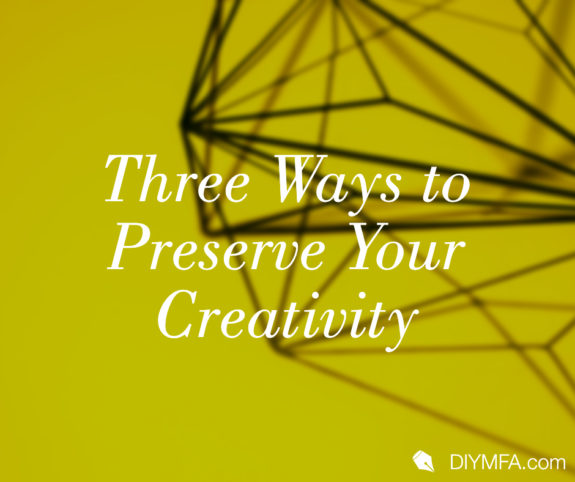Living in the midst of a global pandemic, in addition to being a very terrifying and uncertain experience, has also been an incredibly inspiring one. Since being ordered to remain on social lockdown and distanced from one another, both here in the District of Columbia and elsewhere across the country, my partner and I have seen an enormous amount of creativity emerge from our friends and family (and even ourselves) to maintain that crucial human connection despite the distance. And it’s come in the form of digital group hangouts and happy hours, well-being check-ins between friend groups, plus myriad other activities. Another inspiring thing, too, that has come out of this, has been learning how to preserve my creativity.
As writers, any opportunity we get to write, whether inspiration has hit us or not, we take it. And it’s easy to get caught up in a story or our characters, and keep pushing ourselves until there is absolutely nothing left. But oftentimes, that can lead to a little bit of burnout. And that can sometimes even lead to stories remaining unedited or unfinished. So, just as it’s been important to preserve our creativity during social lockdown, so, too, is it important to preserve our creativity when it comes to our writing to ensure that our stories are getting the absolute best from us.
The following are a few things I’ve learned so far from the COVID-19 pandemic lockdown that I’ve applied to my writing:
1) Don’t overwhelm yourself with too many tasks
In the beginning of the lockdown, it was incredibly easy to dream big about all of the things my partner and I could get done around the house now that we were both at home for the foreseeable future. Between his meetings and phone calls, we could definitely fit in a few new projects and quite possibly rearrange the whole house if we wanted to.
But those dreams quickly gave way to the reality that though we were physically at the house, we were still expending the same amount, if not more, of mental and emotional energy that we would have if we were in our respective offices. So, we had to be more realistic about our task lists. The same could be applied to any writing project.
Though it is ambitious to pull together a massive to-do list for our stories, it’s alright if it all doesn’t get done in one go. We have to account for how mentally and emotionally taxing writing can be and adjust our tasks accordingly. This way, in the times when we actually put pen to paper, our narratives get the full attention they deserve.
2) Exercise different parts of your brain
Even before the lockdown orders came in, I often fell into the trap of doing the same creative exercises day in and day out. Sometimes it would lead to me not being as inspired as I would have liked. Whether those exercises have been journaling, writing in different genres or reading, my creativity was only being pushed so far.
So, in being relegated to our home, I’ve begun to explore different creative outlets like cross-stitching, painting, interior design and songwriting that have pushed me to think about my stories and characters, even worlds that I’ve built, in new ways. There are details that I can better visualize when I’m creating something visual and sounds of my created worlds I can better hear when creating something musical that is much harder to draw out of just the written word.
3) Be sure to take breaks
One of the most important things I’ve learned during this period has been the value of taking breaks throughout the day to give our brains and bodies adequate and ample rest. Much like when we were still physically interacting with the world the way we were before COVID-19, being at home has yielded new daily routines and patterns that we’ve all fallen into and need to take breaks from every now and then. That way we can be our most productive selves and our tasks get the best from us. The same should be applied to our writing.
Whether you’ve sat down for a marathon writing session or have just taken a small section out of your day to get some words down on paper, schedule in periods of rest where you can take a break to keep your mind refreshed. Sometimes, some of my best ideas have come about when I’ve stepped away from something and allowed the story (and myself) a chance to breathe.
In times of crisis or in everyday life, creativity is an incredible gift. And like any gift it deserves to be nurtured and taken care of. So take the time to manage your tasks, exercise different parts of your creativity and get good rest. Because when we can effectively preserve our creativity, we ensure that our stories and characters get the very best that we have to offer them.

Jenn Walton is a writer, editor and storyteller based in Washington, D.C., whose fiction works are housed mainly in the speculative genre. She has completed her first novel project that explores, through the lens of a failing utopia, what happens when society gives in to its fear of the other. She previously wrote for a communications firm where she drafted and edited sponsored and organic content for top-tier academic institutions, Fortune 500 companies and leading philanthropic organizations that has run in The Washington Post, USA Today and the Atlantic. For more from Jenn, please visit her at her website or on Twitter.







